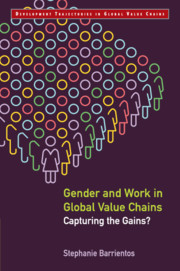Book contents
- Frontmatter
- Dedication
- Contents
- List of Tables
- List of Figures
- List of Abbreviations
- Preface
- 1 Introduction
- 2 Retail Shift and Global Sourcing
- 3 Gender Patterns of Work in Global Retail Value Chains
- 4 Global (re)Production Networks Analysis
- 5 Smallholder (dis)Articulations: The Cocoa–Chocolate Value Chain
- 6 Mixed Outcomes: Downgrading and Upgrading in African Horticulture
- 7 Contested Terrain: The Limits of Social Compliance in Asian Apparel
- 8 Upgrading Strategies: Innovation, Skills and Rights
- 9 Governance Challenges: Promoting Gender-Equitable Value Chains
- 10 Concluding Reflections: Future of Work
- References
- Index
8 - Upgrading Strategies: Innovation, Skills and Rights
Published online by Cambridge University Press: 26 April 2019
- Frontmatter
- Dedication
- Contents
- List of Tables
- List of Figures
- List of Abbreviations
- Preface
- 1 Introduction
- 2 Retail Shift and Global Sourcing
- 3 Gender Patterns of Work in Global Retail Value Chains
- 4 Global (re)Production Networks Analysis
- 5 Smallholder (dis)Articulations: The Cocoa–Chocolate Value Chain
- 6 Mixed Outcomes: Downgrading and Upgrading in African Horticulture
- 7 Contested Terrain: The Limits of Social Compliance in Asian Apparel
- 8 Upgrading Strategies: Innovation, Skills and Rights
- 9 Governance Challenges: Promoting Gender-Equitable Value Chains
- 10 Concluding Reflections: Future of Work
- References
- Index
Summary
Introduction
Global retail sourcing, with its search for cost-effective and cost-efficient production, involves both ‘low road’ and ‘high road’ trajectories. Previous chapters mainly examined the ‘low road’ trajectory of economic and social downgrading, drawing on examples from the cocoa, fresh fruit and apparel sectors in Africa and Asia. An important argument of this book is that retailers and brands seek not only competitive prices and fast delivery but also quality products. A continuum prevails between the low- and high-road ends, with retailers and suppliers positioned in relation to different consumer end-markets. For niche retailers and brands, a focus on quality requires their suppliers to pursue a ‘high road’ trajectory. Investment in innovation and enhanced capabilities facilitates economic and social upgrading. Raising productivity and enhancing skills makes it possible to produce higher-quality products while being efficient and competitive. To achieve this, retailers need to attract and retain more highly skilled workers (often female) by offering better pay, conditions and rights. This has implications for gender patterns of work and the relationship between productive wage work and reproductive unpaid work undertaken largely by women.
This chapter examines a high-road trajectory drawing on two examples, one from Nike's equitable manufacturing (EM) initiative and the other from the Kenyan flower sector. These cases show that a pathway to economic and social upgrading with gender-equitable benefits for workers entails many challenges. Global production is embedded in social norms and institutions that underpin gender discrimination in supplier workplaces and sourcing countries. Women have been drawn into production as a ‘docile’, low-cost labour force, whose socially acquired skills help deliver on speed and quality at competitive prices. Yet global value chains have opened up channels for new forms of contestation, often led by CSOs with women workers also playing an important role.
In both the Nike apparel and Kenyan flower value chains, contestation by CSOs played an important role in pushing back on poor labour conditions during the early stages of global sourcing. However, in both cases, once innovation set in, and the benefits of raising productivity and skills became apparent, economic upgrading became linked to social upgrading. This has led to improved conditions and rights for a largely female workforce. It has also had wider implications for promoting gender-equitable outcomes and addressing issues ‘beyond the workplace’ that affect women's combined productive and reproductive roles.
- Type
- Chapter
- Information
- Gender and Work in Global Value ChainsCapturing the Gains?, pp. 194 - 223Publisher: Cambridge University PressPrint publication year: 2019



